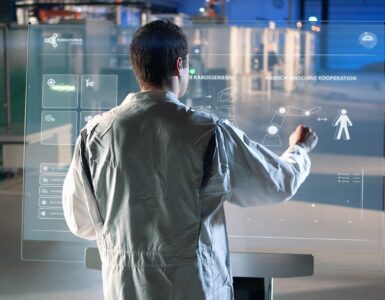So far, probably most of us have primarily associated the metaverse with the entertainment sector. However, it also has significant applications in various industries.
The industrial metaverse is an emerging field with the potential to revolutionize how we interact with and manage complex systems such as machinery, factories, urban infrastructure, and transportation networks. By leveraging immersive, real-time, interactive, and synchronized simulations of real-world environments, it offers a transformative opportunity to enhance operational efficiency, manufacturing processes, and supply chain management throughout a product’s lifecycle. This technology-driven shift will unlock substantial new values for businesses and society across various sectors, enabling richer collaborations among geographically dispersed teams and remote interactions with machinery and assets. As the industrial metaverse continues to drive innovation in design, testing, training, and operations, its market potential is expected to grow quickly, making investment in this sector essential for future competitiveness and success. Figure 1 illustrates the potential of the market over the next few years. As shown, the market value of the industrial metaverse sector exhibits exponential growth. Therefore, it is crucial for us to invest in this sector.

Figure 1- Growing potential of the industrial metaverse market
The industrial metaverse is able to revolutionize the global economy, much like the internet did. It will fundamentally alter daily life for people worldwide, influencing how we interact with our physical surroundings, perform our jobs, and impact the environment.
Transforming Human Environments
The industrial metaverse holds transformative potential to reshape human environments by seamlessly integrating digital and physical realities. This integration creates immersive, data-driven ecosystems capable of revolutionizing urban design and enhancing daily life. A compelling example is Siemensstadt Square in Berlin , where industrial sites are being reimagined as carbon-neutral districts by 2030. Leveraging digital twin ecosystems for efficient development and operational management, such initiatives demonstrate how the industrial metaverse can redefine urban landscapes, making this a vital area for in-depth exploration and research.
Shaping the Future Workplace
The industrial metaverse is poised to redefine the future of work by unlocking groundbreaking possibilities. It enables immersive remote collaboration, breaking geographical barriers and fostering real-time teamwork. By expanding remote work opportunities and enhancing workplace safety through advanced virtual training, it addresses modern workforce needs. Furthermore, as a versatile testing ground for innovations, it supports the creation of flexible and dynamic work environments while driving better decision-making and process optimization. These transformative opportunities make it essential to investigate the industrial metaverse’s role in revolutionizing workplaces across industries.
Promoting Sustainability
The industrial metaverse offers potentials to drive sustainability across industries. Through the integration of real-time data, simulations, and advanced monitoring, it optimizes resource utilization, minimizes waste, and significantly reduces carbon footprints. By supporting innovation in green energy transitions and promoting efficient industrial processes, the metaverse aligns with global efforts to combat climate change and achieve sustainability goals. These capabilities underscore the need for thorough investigation into how the industrial metaverse can accelerate the shift towards more sustainable and environmentally responsible industrial practices.
Some Practical Use Cases:
BMW is using NVIDIA Omniverse to virtually plan production at its upcoming plant in Debrecen , more than two years before physical series production starts in 2025. This marks a milestone in factory planning, reducing costs and increasing efficiency. BMW integrates real-time collaboration across its global network using digital twins for layout, robotics, and logistics. At NVIDIA’s GTC 2023, BMW and NVIDIA showcased virtual planning’s benefits, driving digitalization in manufacturing. Omniverse facilitates global cooperation, optimizing processes and reducing downtime. BMW plans to expand this system across its production network, further advancing its iFACTORY concept for future electric vehicle production.

Figure 2- Virtual BMW factory in Debrecen, Hungary
SIEMENS and FREYR Battery have partnered to scale sustainable battery production using the SIEMENS Xcelerator platform, including Industrial Operations X software and hardware. This collaboration will enhance FREYR’s gigafactory production in Norway and the U.S., integrating SIEMENS‘ automation and digitalization technologies across the battery design and manufacturing process. By leveraging tools like Product Lifecycle Management (PLM) and industrial edge computing, FREYR aims to boost efficiency and affordability of EV batteries and energy storage systems. SIEMENS and NVIDIA have also developed an industrial metaverse showcase, utilizing digital twin technology to optimize manufacturing processes in immersive environments.

Figure 3- SIEMENS-FREYR Industrial Metaverse Framework
List of Figures:
Header: Own depiction.
Figure 1: ABI Research, Evaluation of the Enterprise Metaverse Opportunity, Third Quarter, 2022
Figure 3: https://www.youtube.com/watch?v=LQyKc6SI5u8
References:
[1] L. Ren et al., “Industrial Metaverse for Smart Manufacturing: Model, Architecture, and Applications,” IEEE transactions on cybernetics, vol. 54, no. 5, pp. 2683–2695, 2024. [2] “The-emergent-industrial-metaverse-update-2024,” https://www.technologyreview.com/2023/03/29/1070355/the-emergent-industrial-metaverse/ [3] https://www.technologyreview.com/2022/12/05/1063828/the-industrial-metaverse-a-game-changer-for-operational-technology/ [4] https://www.press.bmwgroup.com/deutschland/article/detail/T0411467DE/bmw-group-auf-der-nvidia-gtc:-produktion-im-kuenftigen-werk-debrecen-laeuft-schon-virtuell?language=de [5] https://press.siemens.com/global/en/pressrelease/freyr-scale-battery-cell-gigafactory-production-siemens-xcelerator





















Kommentare hinzufügen